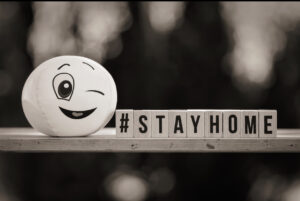Everywhere we look for what seems like forever (has it really been only a couple of months??) we’re bombarded with the new words and phrases endlessly repeated in media and politics and subsequently adopted by the masses.
“In this unprecedented time…”
“Social distance…”
“Stay Home, Stay Safe…”
“Alone together…”
And in my opinion, the worst—“New normal.”
I saw a guy in a hat the other day that said, “Make Orwell Fiction Again” and you know what—it’s true! The “new normal” that they want us to accept looks more like something out of 1984 than what we’d envisioned for 2020. All these new words and phrases are the epitome of Orwell’s “newspeak”—they all carry with them heavy “other” meanings and hints to their user’s level of fear, political leanings, and trust in the CDC or the President.
 Right now words aren’t just words—everything means something else. At least to those of us who are paying attention. But not everyone is paying attention. Not everyone bristles at the newspeak in commercials and news stories. Some people just adopt this new language without considering the motives of those who have crafted the narrative. Some people are just kind of rolling along with all of this without seeing a bigger picture or problem—in fact, I suspect they think people like us are kind of crazy.
Right now words aren’t just words—everything means something else. At least to those of us who are paying attention. But not everyone is paying attention. Not everyone bristles at the newspeak in commercials and news stories. Some people just adopt this new language without considering the motives of those who have crafted the narrative. Some people are just kind of rolling along with all of this without seeing a bigger picture or problem—in fact, I suspect they think people like us are kind of crazy.
I’ve noticed something interesting as I’ve scrolled through social media or chatted with friends about the current state of the world and the perceived way forward—something that has given me an insight into the fear many people feel, not in regards to any virus, but rather at the thought of taking true ownership of their lives without being somehow forced or compelled to do so.
Although I’ve found the left/right divide that I expected to see—the left for the most part being more in favor of heavy-handed government solutions in the form of bailouts and stimulus and contact tracing, and the right showing slightly more concern for perceived civil liberties violations and the rights of people to work and worship—I’ve been surprised to discover that a lot of the folks who have willingly adopted the vision of a “new normal” don’t really have strong opinions on the more politically charged reasons that people either support or abhor these lockdowns and all that come with them.
What I’ve observed in my wholly unscientific study, which consisted entirely of perusing social media threads and community pages trying to get a feel for the current “new normal” vibe, is that a lot of people who want life to be divided into a pre- and post- COVID-19 way of doing things actually just really like working from home, having an excuse to commit to fewer engagements, having dinners every night as a family, and having their spouse and kids around more.
 They’re not fired up about being able to get back to work—they’ve used the lockdown for home improvement projects, and their financial future feels relatively secure. They don’t really care too much that rentals are opening up along the coast and they’ll be “allowed” to travel soon, or that the fallout from the shutdown in the form of everything from skyrocketing food prices and possible shortages to devalued currency and inflation promise potentially life altering consequences for all of us.
They’re not fired up about being able to get back to work—they’ve used the lockdown for home improvement projects, and their financial future feels relatively secure. They don’t really care too much that rentals are opening up along the coast and they’ll be “allowed” to travel soon, or that the fallout from the shutdown in the form of everything from skyrocketing food prices and possible shortages to devalued currency and inflation promise potentially life altering consequences for all of us.
My friend Sarah, a realtor in a small town in Georgia, took to social media the other day to share a “gratitude” post. She wrote about all the reasons she was grateful for this shutdown, and why she didn’t want life to ever go back to normal. Grateful for this shutdown? I couldn’t even wrap my head around it, and yet here was my friend, displaying some type of nostalgia for her state being shut down even as it was just beginning to open!
I scrolled through the comments on her page, thinking surely I’d find some people pointing out all of the devastation and destruction of life and business and freedom that she neglected to mention—or even notice—but what I found instead shocked me. All of her friends were agreeing with her, and even adding their own experiences and longings for life to never again go back to the way it was “before.”
I know better than to wade into small-town social media debates so I just shook my head and moved along, but her post has stuck with me and I’ve found myself frequently thinking back to it— trying to figure out why she would have such a rosy view of what I see as one of the worst experiences ever. Don’t get me wrong—I love having my husband around more, and it’s been great to be able to just not make plans, instead of making plans and then trying to come up with a valid reason to cancel them when I really just don’t feel like doing my makeup. But I can’t understand how anyone could feel that things are somehow better this way.
I think I’ve finally made some sense of it. See… I know that I own my life—even when the government does terrible things that make me feel like I’m literally (dramatically) trapped in my house. I unschool my seven children. I work from home for an organization that I love and whose mission means something to me. The life my husband and I have made for our family has been carefully crafted—often at great personal, professional, or financial sacrifice—and for the most part, I can say that no one else has a claim to our time or energy but us. Sure, we often choose to give ourselves over to things that we value, but we always know that anytime things aren’t working well for us anymore, we can stop and make the needed adjustments in order to bring life back under our control.
I took a moment to put myself into my friend Sarah’s shoes, and I began to see why a lot of people perceive a return to normal life with dread.
The norm for Sarah, and millions of families like hers, involves spending every day, morning to night, beholden to someone else’s timelines and expectations. By the time families finally come together in the evenings, everyone is exhausted and homework and dinner haven’t even happened yet. There are virtually unlimited numbers of sports and extracurriculars and clubs, and, for whatever reason, a lot of families devote enormous amounts of time and energy and expense to making sure their children are in as many of them as possible.
The times when families are supposed grow and bond and learn together have become times of stress and frustration and hurry—meals are grabbed from a takeout window and gobbled down on the way to practice, or rushed through so that the hours of homework can be tackled before it gets too late because everyone has to be up early to catch buses and get out the door for work so that it can all start over again the next day. Rinse, lather and repeat—basically forever.
No wonder a “new normal” sounds good.
Many families are longing for calm and connection so badly that they’re willing to sacrifice essential liberty to purchase a little peace. At least that’s the way they’ve sold it to themselves. What I think has really happened is that people are scared to death to acknowledge that they have been miserable and to take big and potentially scary steps to fix it.
It’s a lot easier to say that the government has forced you to become homeschoolers because the state shut the schools than it is to face down your judgy PTA friends and confess that you actually hate handing your kids over to someone else for the most formative years of their lives. It’s easier to be forced to scale back your lifestyle because one partner’s livelihood was suddenly deemed non-essential by state mandate than it is to face the questioning looks of neighbors and the gossip of supposed friends when one of you quits your job and you decide to become a one-car-family so that you can afford to stay home with your kids and craft the home environment your family longs for. If all the sports and after-school clubs are cancelled, then you don’t have to be the only ones who aren’t participating and you don’t have to feel like your kids are somehow the outcasts.
As I came to these realizations, I began to feel tremendous compassion for the Sarah’s of the world. People—lots of peopl —don’t want to go back to the way things were before an unseen authority forced them into their homes and away from many of their burdens and heartaches and choices. Is it so hard to imagine that they would come to see that authority as some sort of savior, and even appeal to it to keep them locked into this “new normal” forever? Choice can be a heavy burden sometimes.
What I have seen in comment threads and community pages hasn’t been the rampant ignorance and apathy that I assumed was behind the embrace of a “new normal”—rather it has been a collective realization by many that they have not owned their own lives and that this taste of what they ironically have come to view as “the new freedom” is something they cannot bear the thought of living without again.
It shouldn’t take a heavy-handed government, or the removal of individual agency, or a global pandemic to make people realize what they want their lives and families to look like, but I think that for a lot of folks that’s exactly what has happened. And they really, really, don’t want things to go back to the “old normal.” I can’t blame them. Their old normal sounds terrible to me—I couldn’t live with it either.
 I’ve decided that maybe it wouldn’t kill me to set aside my normally fiery passion and principle over these next few weeks and instead focus my efforts on helping the people I encounter who are longing for their “new normal” to at last find the courage to craft it through their own actions and decisions instead of clinging to government as the guarantor of their happiness.
I’ve decided that maybe it wouldn’t kill me to set aside my normally fiery passion and principle over these next few weeks and instead focus my efforts on helping the people I encounter who are longing for their “new normal” to at last find the courage to craft it through their own actions and decisions instead of clinging to government as the guarantor of their happiness.
Most of us didn’t start out as liberty-minded as we are now. A lot of people live in a world that doesn’t look anything like the one we see. Most people are just doing the best that they can for themselves and the people they love, and it would be a shame if we missed the chance to win hearts and minds because we misunderstand their motives and dismiss them with an, “Okay, Karen,” instead of helping them see the life they want through a lens of freedom and self-ownership rather than submission to imagined authority. And then maybe we can agree to unlock the lockdown and make those choices for ourselves.
I’ve heard it said that “love wins.” I don’t know if it’s always true, but I know it’s always worth a try.
 Katie Phipps Hague is an unschool mom of seven, a freelance writer, and the Social Media Coordinator at Libertas Institute where she acts as the online voice and content creator for the Tuttle Twins social accounts. She is an outspoken advocate of education and medical freedom and uses her social media reach and her knack for wordsmithing to spread the messages of self ownership, liberty, and alternative home education.
Katie Phipps Hague is an unschool mom of seven, a freelance writer, and the Social Media Coordinator at Libertas Institute where she acts as the online voice and content creator for the Tuttle Twins social accounts. She is an outspoken advocate of education and medical freedom and uses her social media reach and her knack for wordsmithing to spread the messages of self ownership, liberty, and alternative home education.
The FF Forum is a publication of FreedomFest, “the world’s largest gathering of free minds,” which meets at Caesars Palace in Las Vegas July 13-16, in the normal way– socializing, networking, and talking face to face. For tickets and information, go here.

